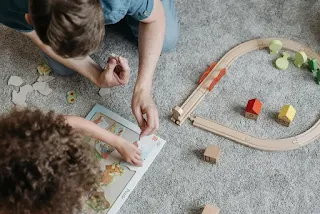Puzzles for Kids are a great way
to grow their brains while having fun. These activities promote critical
thinking and problem-solving and are fun for kids. Children learn about
patterns, how things connect, and problem-solving by solving puzzles. Puzzles(jigsaw, crossword) and apprenticeships and skills to solve them are excellent
ways of leading on with skills that help build. In theory, if you can navigate
a maze and be confident in your actions, those are the essential ingredients
for virtually anything life throws at us.
How Puzzles Are Beneficial for Kids
Fine Motor Skills and
Hand-Eye Coordination One outstanding benefit of solving jigsaw puzzles is that
they help develop crucial dexterity in children as they manipulate puzzle
pieces, essential for tasks like writing or operating tools. Puzzles also
encourage patience and resilience, requiring kids to keep trying until they
find the right match or solution.
Types of Puzzles for Kids
Naturally, we have all sorts of puzzles related to different cognitive developments—some more catered to specific ages and interests. Jigsaw puzzles are maybe the most common, and they range in subject matter and difficulty levels, making them well-suited for any personality type. Crossword puzzles help expand vocabulary and increase language skills; math puzzles foster numeracy and analytical reasoning.
As children interact
with various types, they learn where their interests and competencies lie,
which can assist in other learning experiences as they grow. In summary,
integrating puzzles into a child's schedule helps their cognitive development
and turns learning into amusement.
The bottom line is that puzzles are irreplaceable learning tools from our more playful side of life. Strangely enough, they take the form of puzzles for kids. They foster basic skills and give way to creativity and victory. Caregivers and educators who embrace puzzles in both home and academic settings can ensure children realize their fullest potential while having fun on the learning journey.
Choosing Puzzles for Children
When selecting puzzles
for kids, one should consider the child's age, skill level, and interests.
Puzzle selection is essential, as we must choose age-appropriate puzzles based
on skill level and theme. Younger children may prefer a jigsaw puzzle with
fewer (more significant) pieces, which is more achievable and feeds their
appetite to be bigger problem-solvers. As they get it, add more complex
knifework or themes that may stump them to keep them interested.
Integrating Puzzles into Your Day
If exercises and puzzles
become a daily routine, the likelihood of their effectiveness as educational
tools increases. For example, scheduling puzzle-solving time as one of your
bedtime activities can provide a fantastic opportunity for interaction within a
family. Also, educators can include puzzles in their lesson plans, and oldsters
could use these interactive thought teasers to help children grasp the
coursework taught in class. When kids learn via puzzles, they get a chance to
improve their critical thinking and problem-solving skills informally.
Collaborative Puzzles
Social Skills
Solving puzzles is a
collaborative process and an excellent opportunity to help children work in
teams. Bringing children together to complete a puzzle teaches communication,
creativity, and role negotiation, which sets kids up for good people skills. It
brings peers together, strengthening their bonds with each other and
transforming learning into an enjoyable shared venture.
In short, strategic subjection and marking of kids' puzzles can produce worthwhile benefits by developing cognitive skills with a fun side. Optimizing many benefits: Caregivers and educators who acknowledge that children are playful learners with diverse developmental needs can create a home where puzzles hold court as an adored educational instrument.
Technology and the Child Jigsaw Puzzle
Technological advances
have changed how puzzles are presented and handled in this digital age. Today,
online platforms and mobile applications solve numerous puzzles for children,
such as interactive jigsaw puzzle games or digital crossword challenges.
Children can learn with puzzles anytime, anywhere, making them even more
accessible. On top of that, gamified elements are built into many online
puzzles to entice younger solvers in a fun way.
Screen Time and Non-Tech Puzzles
Although the digital version of a jigsaw puzzle has advantages and different kinds, traditional hands-on experience is also significant as it will help you learn using maximum sensory organs. Still, screen time can give you some things we are looking for. While physical puzzles are great for developing fine motor skills, they offer an essential sensory experience for younger toddlers. This encourages a blend of both and is the backbone to promote a balanced approach to learning & development.
Independent Puzzle Solving
Encouraging autonomy in
problem-solving can significantly boost constructive reasoning. Children
benefit significantly from the opportunity to work on a puzzle independently,
developing independence and confidence in solving problems. Families and
educators can also help by increasing the challenge level of puzzle play
incrementally over time while providing hints when necessary to enable them to
feel confident solving puzzles on their own.
How Puzzles Increase Academic Success
Not only does play boost
mood and creativity, but research also shows a correlation between solving
puzzles for kids (and adults) and enhanced academic performances. The ability
to solve puzzles helps students develop the RVG mental skills of logic and
reasoning, spatial understanding, and number competence, among others, which
are essential in math and science. Creating a solid cognitive foundation helps
to show how puzzles and play-based learning can lead us down the path of a
lifelong love for education.
Conclusion
To sum up, puzzles for kids will not only bring joy to your child but also skill development that is an integral part of their life's total growth. It combines the tradition of puzzles and modern technology to provide a full-on way for children, especially young kids, so they may be prepared well enough to embark on academic life with an add-on feature of inculcating a lifelong learning experience. Putting puzzles in daily activities can help new learners develop critical thinking skills, nurture creativity, and practice collaborative problem-solving, making learning enjoyable.







Post a Comment